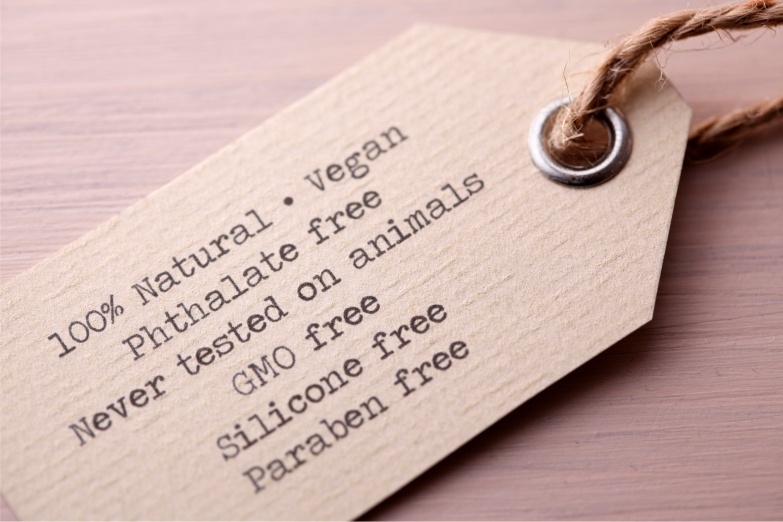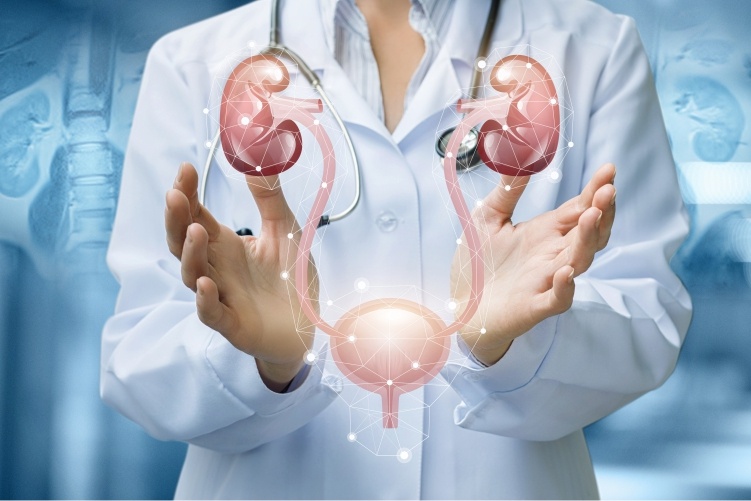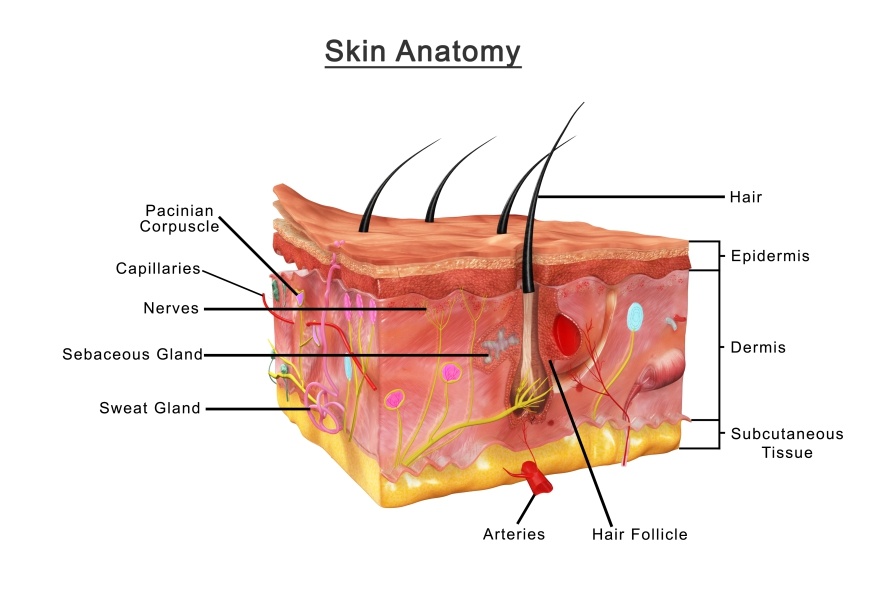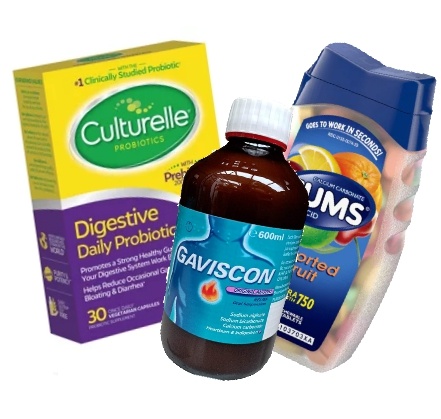PHARMACY CORNER
Spring Cleaning

By Stephanie Simons,
Head Pharmacist,
Lindo’s Pharmacy in Devonshire
As we shed the remnants of winter, it’s time for longer days, more time outside – and, of course, the annual spring clean. Though traditionally a household task, many are looking this year to clean up their healthcare products too. The ‘clean’ movement has been spreading rapidly throughout the beauty, wellness, and pharmaceutical industries – but what exactly does ‘clean’ mean in this context?
Although the term ‘clean’ is used on thousands of product labels, from shampoo to supplements, it bears no regulatory definition. To some, it means ‘non-toxic’ – a product that contains few or no known allergens, irritants, or harmful chemicals. To others, it means ‘natural’ – a product made solely or partially from nature, such as water or plant extracts – while some consider ‘clean’ to mean more environmentally friendly and/or vegan.
While products that are better for you and the environment have an obvious appeal, some experts claim the movement is simply a marketing campaign that aims to scare consumers away from some products and attract them to others. With so many definitions flying around, how do we decide on the right products for us?
Are ‘clean’ products safer?
Prescription drugs and treatments are tested and regulated for safety, but over-the-counter products are less monitored. Cosmetics, for example, are only tested and approved by the FDA if they contain color additives.
Across ‘clean’ marketing campaigns, there are some ingredients that many brands seek to disavow – but that doesn’t mean they should be avoided at all costs.
• Alcohol – In addition to our favourite tipples, alcohol is often included in health and beauty products to help preserve the product. While some forms of alcohol can cause irritation, especially for sensitive skin, there’s also evidence that cetearyl alcohol and cetyl alcohol – or ‘fatty’ alcohol – actually soothe frizzy hair and dry skin if formulated correctly.
• Parabens – Preservatives like ethlyparaben, methylparaben, and butylparaben are used in a wide range of products to prevent bacteria and mould. Many brands have eradicated all parabens from their products, yet there is little to no evidence that they do cause harm – in fact, some of the synthetic alternatives have been known to cause more allergic reactions.
• Essential oils – Formerly a favourite, essential oils are being left out of ‘clean’ products like shampoo or bubble bath due to their risk of irritation. Derived from highly fragrant plants like lavender or rose, essential oils can have aromatherapy benefits, but there is little science to back up any higher claims.
Is ‘natural’ better?
More and more, we are all trying to limit our impact on the environment and, in turn, limit its impact on us. In many ways, this is a positive thing – eating plenty of fresh fruit and vegetables has a plethora of health benefits, while natural remedies like ginger tea for nausea or lavender to aid sleep are used throughout the world. Yogi and Traditional Medicine Teas or Kalms Lavender are great products, packed full of the earth’s best ingredients.
That said, some products can be termed ‘natural’ without in fact being better for you or the environment. Hyaluronic acid, for example, is termed ‘natural’ when taken from horses and cows’ umbilical cords – while synthetic forms are just as effective but cause less damage to animals and the environment. Try Honey Pot, Nubian Heritage, or Avalon Organics for effective products from eco-friendly companies.
All bodies are different
All bodies are different, and products with a ‘clean’ label don’t guarantee safety any more than those without. The best thing is to keep a note of products that work for you and your health. Whether you’re looking to try a new herbal remedy or searching for a more eco-friendly sunscreen, your pharmacist is always on hand to offer advice and suggest products which might be suitable.
If you are unsure about a product or ingredient and/or experiencing an allergic reaction, speak to your GP or pharmacist as soon as possible.
Stephanie Simons is the head pharmacist at Lindo’s Pharmacy in Devonshire. She earned her Bachelor of Science in Pharmacy at Massachusetts College of Pharmacy and has been practicing for over 20 years. She is a registered pharmacist with the Bermuda Pharmacy Council and is a member of the Bermuda Pharmaceutical Association.
It’s time to talk about UTIs

By Stephanie Simons,
Head Pharmacist,
Lindo’s Pharmacy in Devonshire
When it comes to general aches and pains, we’re used to chatting them through and seeking help. However, there are some issues that can cause embarrassment and lead us to delay getting the help we need. Urinary Tract Infections (UTIs) are one such issue, but while it can be uncomfortable (both to discuss and tolerate), it’s important to tackle the infection as soon as possible before it leads to more serious problems.
UTIs occur when bacteria, usually from your poo, enters the urinary tract, causing an infection in your urinary system – either the bladder, urethra, ureters or kidneys. As women have a shorter urinary tract than men, bacteria are more likely to reach the organs and cause a UTI, and two-thirds of women experience this kind of infection at some point. However, UTIs can also occur in men and children.
Sexual intercourse is a key cause of UTIs, as it enables bacteria to be easily transferred into the urinary tract. Women are advised to urinate after any sexual activity to flush out any misplaced bacteria. Chemical irritants in bubble bath or perfumed soap can damage the urethra, making it more vulnerable to bacteria too.
Hormone changes during pregnancy and menopause can also increase the likelihood of UTIs, as can conditions that prevent you fully emptying your bladder like constipation or an enlarged prostate gland in men. People with a weakened immune system such as those with diabetes or undergoing chemotherapy are also at a higher risk.
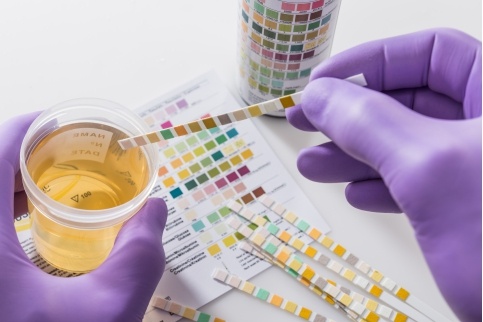 So how do you know if you have one? The most common symptoms include pain or burning sensations when you pee, the need to pee more often than usual, cloudy urine, and lower back or stomach pain. More severe cases can cause blood in the urine, a high fever, chills, vomiting, or a very low temperature. If you’re experiencing any symptoms, do speak to your GP to arrange a urine test.
So how do you know if you have one? The most common symptoms include pain or burning sensations when you pee, the need to pee more often than usual, cloudy urine, and lower back or stomach pain. More severe cases can cause blood in the urine, a high fever, chills, vomiting, or a very low temperature. If you’re experiencing any symptoms, do speak to your GP to arrange a urine test.
Many UTIs resolve themselves within a few days. You can take paracetamol products like Panadol or Tylenol to help with pain and any high temperature and be sure to rest and consume plenty of liquids. Your GP may prescribe antibiotics and your local pharmacy will stock a range of products specifically targeting UTI symptoms such as Cymalon and Phenazopyridine. Some evidence suggests cranberry supplements like N.B. or Sundown Cranberry Capsules can also speed recovery, while creams like Vagisil may relieve soreness while you wait.
It’s always important to seek medical advice as severe UTIs, if left untreated, can lead to a kidney infection. Without treatment, kidney infections can cause permanent damage to your kidneys and the bacteria may spread to your bloodstream causing life-threatening infection. Kidney infections are particularly dangerous for pregnant women as they can cause premature delivery and the associated risks for both mother and baby.
You can reduce your chance of developing a UTI with a few simple techniques. Hygiene is key – keep the genital area clean and dry and be sure to wipe from front to back when you finish using the toilet. Drink plenty of water to stay hydrated and wash the skin around the vagina before and after sex if possible.
While it can be a difficult topic to discuss, UTIs are very common and there’s nothing to be ashamed about. Your GP or pharmacist will be happy to help diagnose and treat a UTI so you can avoid more severe symptoms and feel back to normal as soon as possible.
Stephanie Simons is the head pharmacist at Lindo’s Pharmacy in Devonshire. She earned her Bachelor of Science in Pharmacy at Massachusetts College of Pharmacy and has been practicing for over 20 years. She is a registered pharmacist with the Bermuda Pharmacy Council and is a member of the Bermuda Pharmaceutical Association.
Skin Deep

By Stephanie Simons,
Head Pharmacist,
Lindo’s Pharmacy in Devonshire
The body’s largest organ is the skin. Just as crucial as the heart or brain, our skin protects the rest of the body from the external world, from harsh temperatures to harmful bacteria. However, it isn’t without its own vulnerabilities. Whether we’re battling skin disease or worried about premature ageing, it’s critical that we understand our skin – and how to take care of it.
Structure
Our skin is made up of three layers, the epidermis, subcutis, and dermis.
Keratinocytes are the main building blocks of the epidermis and produce the protein keratin. The epidermis is also home to sweat glands, sebaceous (oil) glands, hair follicles and melanocytes which produce a pigment called melanin that protects us from UV rays.
Below the epidermis, the subcutis – or hypodermis – is made up of fibrous tissue and adipose (fat) and varies according to your size and weight. The dermis underneath is much thicker. Formed of collagen and elastin, it insulates the body while cushioning it against external trauma.
Function
The skin is not only the biggest organ, but also one of the most important, with several critical functions.
Its main function is to prevent water loss and shield the body from physical and chemical harm. A key part of the immune system, the skin fights off bugs, allergens and other toxins in our surroundings. It also enables the absorption of Vitamin D from sunlight, helping our bodies protect against numerous diseases like osteoporosis and cancer.
The skin enables our sense of touch so we can interact with the physical world, sense danger and injury, and enjoy pleasurable sensations. It’s also key in terms of physical attraction. The skin’s appearance, texture and quality play a significant role in our perception of health and beauty, though this tends to vary across cultures.
Skin care
Taking care of our skin is good for bodily health and our appearance. A simple, consistent routine can keep your skin comfortable and healthy while more advanced products can tackle a wide range of issues, from acne and pigmentation to wrinkles and collagen loss.
To maintain general skin health, it’s important to wash your face morning and night. For oilier skin types, try a face wash like Neutrogena Oil-Free Pink Grapefruit wash or scrub, while dry or sensitive skin might prefer a creamy cleanser like Cerave Hydrating Cleanser. Reinforce your skin’s barrier function with a layer of moisturiser – Cerave Facial Moisturiser AM and PM formulas are a great all-rounder, and Eucerin works wonders for sore or dehydrated skin. In the daytime, be sure to apply – and reapply – sunscreen of SPF 30+ such as Neutrogena Daily Moisture or Cerave AM Moisturiser lotion. This greatly lowers risk of skin cancer and helps prevent premature ageing.
There are a few key ingredients that can help you get even better results. For anti-ageing, there’s nothing better (and more scientifically proven) than Vitamin A, ranging from over-the-counter retinol products like Neutrogena Rapid Wrinkle to full strength tretinoin available only on prescription. Whatever strength, these products can irritate skin if used too often – start once a week and build up from there.
For spots or acne, a helpful ingredient is Salicylic Acid, an exfoliant that dives deep into pores and clears them out. Try a cleanser like Neutrogena Acne or Cerave Acne or a targeted spot treatment like Neutrogena Rapid Clear or Neutrogena Stubborn Marks. Products containing antioxidants like Vitamins C and E can also help protect your skin from external aggressors – try applying a serum like Avalon Organics Intense Defence Vit. C Face serum before your moisturiser.
Inside and out
You can also support your skin through your diet. Vitamin D plays a key role in building healthy skin cells: try oily fish, mushrooms or a supplement like Olly Glowing Skin Gummies or Alive Hair, Skin and Nails. Vitamin C can help to repair skin and retain its moisture. Citrus fruits, broccoli, and supplements like Nature’s Bounty Vit. C can boost your levels. Reducing your sugar intake is also proven to significantly improve your skin.
We’ve come a long way in understanding the skin and how to care for it. If you’re worried about your skin or simply want to make sure it is healthy, you can always talk to your GP or pharmacist. By protecting your skin, you’re protecting your whole body.
Stephanie Simons is the head pharmacist at Lindo’s Pharmacy in Devonshire. She earned her Bachelor of Science in Pharmacy at Massachusetts College of Pharmacy and has been practicing for over 20 years. She is a registered pharmacist with the Bermuda Pharmacy Council and is a member of the Bermuda Pharmaceutical Association.
Trust your gut

By Stephanie Simons,
Head Pharmacist,
Lindo’s Pharmacy in Devonshire
Let’s face it – we give our tummies a hard time. When we’re not complaining about them, we’re squeezing them into skinny jeans, filling them with fast food, or trying to crunch them into nonexistence. But why is this? On the one hand, our stomachs contain powerful tools that give us energy, build our strength and, ultimately, keep us alive. Yet for some they also cause a variety of problems.
The region of the body between the ribs and the pelvis contains the digestive system, a series of organs, including the stomach, intestines, pancreas, liver and gallbladder, loosely connected by tissue that enables them to expand, shrink and move against each other. The kidneys and spleen are also located in the abdominal area.
Your digestive system processes the food we eat and breaks it down into smaller parts that our bodies can absorb: carbohydrates into sugars, proteins into amino acids, and fats into fatty acids and glycerol. This provides us with energy and enables growth and cell repair – all vital for our bodies to function. So where do the problems start? And how can we tackle them?
IBS
Irritable Bowel Syndrome (IBS) is the most common gastrointestinal disorder, affecting up to 15% of people in the US. Disruption in the small and large intestines causes abdominal pain often surrounding bowel movements, leading to diarrhoea, constipation, bloating and/or flatulence.
There is no direct cure for IBS, but many people manage their symptoms by adapting their diet and lifestyle. Known to slow down or speed up digestion, anxiety and stress are key triggers of IBS. It’s therefore important to find ways to relax, particularly around mealtimes. Exercise and meditation are known to reduce stress levels, or you could try an herbal remedy like peppermint, ginger or fennel teas an hour or so before you eat.
Studies also show that probiotics may improve digestion and thus ease IBS symptoms. Many yogurts have added probiotics or you could try a supplement like Culturelle or PB8 to help get things moving. Alternatively, some find IBS remedies like Colpermin or digestive enzymes can be useful or you can speak to your GP or pharmacist.
Around one in ten people experience bloating, whether or not they have other IBS symptoms. We all know an overly large meal can make us bloat – one high in fat can have the same effect, as fats take longer to digest and keep the stomach full for longer. Eating too fast also cause your abdomen to swell. Limit your fats and take your time when eating to help reduce your symptoms. You could also try Beano, Gas-X or digestive enzymes to smooth things along.
Bloating can also be caused by gas in the digestive system – half of which is simply swallowed air building up in the intestines. Again, eating slowly can help as it reduces the amount of air you ingest. Avoid drinking from a straw and aim for still rather than fizzy drinks to further lower the levels of gas blocking things up.
Acid reflux
We all know that feeling – you’ve just finished a great meal, but your chest is starting to burn. This is due to acid reflux, when the acid formed in the stomach through digestion begins to travel upwards towards the chest. This can also leave a sour taste in your mouth.
Many things can cause acid reflux, from certain foods and drinks like coffee, tomatoes, alcohol, and fatty or spicy foods, to smoking, stress and/or pregnancy. Antacids like Tums or Gaviscon are the quickest way to relieve your symptoms – aim to take them with your meal or soon after. Stronger acid reducers like Omeprazole or Famotidine can also be helpful. Longer term, quitting smoking, easing your stress and/or avoiding foods that trigger your symptoms are the best ways to avoid the dreaded heat.
No one’s stomach always feels comfortable – there are too many complex processes at work. The simplest ways to ease your digestion are to eat healthy meals, exercise as much as you can, and speak to your pharmacist if you need some extra assistance.
If you’re experiencing significant pain and discomfort, always speak to your GP.
Stephanie Simons is the head pharmacist at Lindo’s Pharmacy in Devonshire. She earned her Bachelor of Science in Pharmacy at Massachusetts College of Pharmacy and has been practicing for over 20 years. She is a registered pharmacist with the Bermuda Pharmacy Council and is a member of the Bermuda Pharmaceutical Association.
The most wonderful time of the year
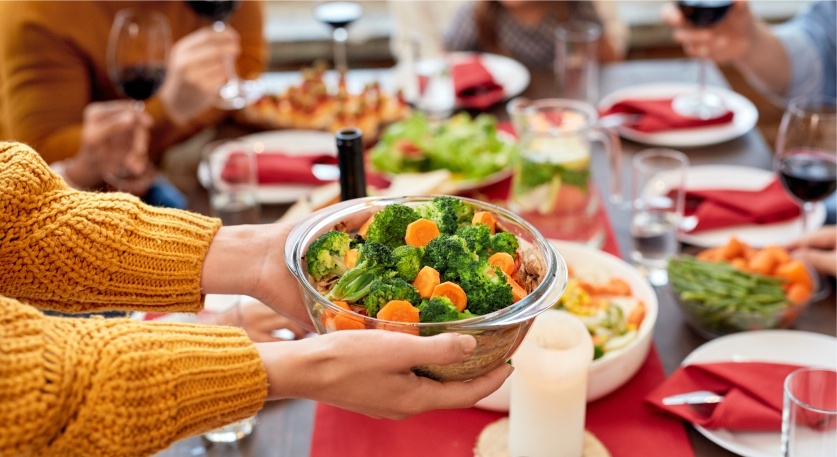

By Stephanie Simons,
Head Pharmacist,
Lindo’s Pharmacy in Devonshire
The holidays are a time to enjoy yourself, something most of us accomplish very well! But this indulgent period is often followed by hangovers, weight gain and low mood that lasts long past the festivities. However – what if I told you there are ways to keep your health in check whilst also revelling in the party season?
No one wants to trade in their Christmas dinner for a leafy salad, but there are little changes you can make to maintain balance, and start the new year feeling good.
Before
Starting the festive season in prime health is one of the best ways to make sure your body bounces back afterwards. In the weeks leading up, pack in the fruit and vegetables to boost your vitamin levels and get a good night’s sleep as often as possible – this will build your immune system and prep you for the coming party time.
The day of an evening gathering or celebration, drink plenty of water to stay hydrated and eat regular balanced meals. Don’t be tempted to skip food to make up for the upcoming alcohol calories – you’ll miss out on key nutrients, and be likely to eat more unhealthy food at the event itself. An empty stomach also makes you more vulnerable to alcohol’s effects, taking you from merrily tipsy to cringeworthy drunkenness.
This is also a good time to check in with your mental health. Do you really want to go to that party? It’s normal to feel a sense of obligation around the holidays, but try to prioritise the activities which make you feel good and don’t be afraid to turn down those unwanted invitations. In a week or two, no one will even remember who attended what.
During
At the party, the key thing is to keep things in proportion. Help yourself to food and drink, but move away from the buffet when you’re done to prevent mindless grazing. Try to limit the booze to one drink per hour and alternate with soft drinks to keep your body hydrated. By keeping track of your drinks, you’re far less likely to have one too many – and feel the consequences the next day.
While large feasts are a staple of the season, heartburn and lethargy certainly shouldn’t be. Try to eat slowly and mindfully, savouring each bite and stopping when you’re no longer hungry – rather than when you’re full. Balance your plate with Christmas vegetables and try a short walk after dinner to keep your digestion running smoothly.
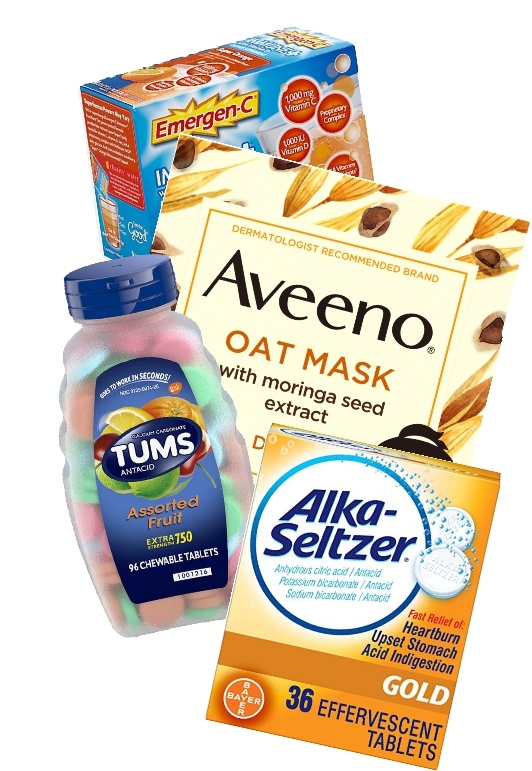
After
Ah, the dreaded morning after.
If you can stomach a cooked breakfast, reach for mushrooms – full of energy-giving B vitamins – tomatoes for their immune-boosting Vitamin C, spinach for its DNA-repairing folate, chilli or cayenne pepper to get your blood flowing, and onions, which soothe your liver with their sulphur compounds. Smoothies are also a great way to kickstart your body after a big night – pack yours with potassium-rich fruits like banana or orange to replenish the electrolytes lost through your alcohol intake.
We all love leftovers, but if they’re not safe – don’t do it! December sees a peak in food poisoning as people pick at food that’s been left out. Make sure you’re only reaching for food that’s freshly cooked or straight from the fridge.
Still feeling rough?
Even with the best intentions, we can all fall foul to festive temptation. Luckily, your friendly pharmacy is here to help. Eaten too much? Try Tums, Omeprazole or Famotidine to beat indigestion and heartburn. Hangover from hell? Reach for a rehydration sachet like Nuun, Emergen-C or Berocca to boost your electrolytes, and a stomach-friendly painkiller like Tylenol or Alka-Seltzer Gold if that head just won’t stop banging.
Vitamins B and C are particularly important during holiday festivity – try Berocca and B-Complex+C to keep your levels nicely topped up – and why not treat yourself to a quick face mask like Aveeno Oat Mask Detox or St. Ives Fresh Skin or Energizing Scrub to boost morale after one party too many.
The holidays are a great time to reconnect with loved ones and enjoy our favourite traditions. But with these few little tweaks, you can also avoid the January slump. If you are feeling unwell or in need of medical attention, always seek advice from your GP or pharmacist.
Stephanie Simons is the head pharmacist at Lindo’s Pharmacy in Devonshire. She earned her Bachelor of Science in Pharmacy at Massachusetts College of Pharmacy and has been practicing for over 20 years. She is a registered pharmacist with the Bermuda Pharmacy Council and is a member of the Bermuda Pharmaceutical Association.
Your first line of defence
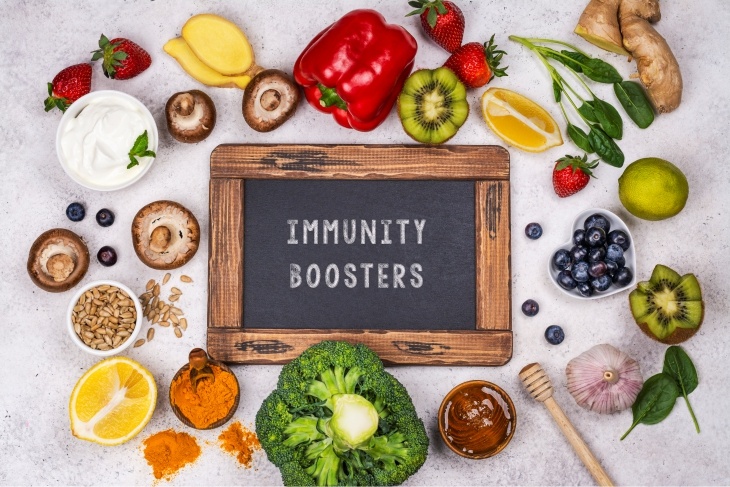

By Stephanie Simons,
Head Pharmacist,
Lindo’s Pharmacy in Devonshire
It’s that time of year again, when everyone’s blowing their nose or got a tickle in their throat. Just as the dreaded pandemic is starting to ease, bugs like the common cold are back with a vengeance. Luckily, we have our immune systems to help us weather the storm. But what is the immune system? And how can we best support it?
What is the immune system?
The immune system is our body’s complex network of organs, cells and chemicals that work together to try to keep out germs and fight the ones that do get in.
It is made of two types of system that work together to keep you healthy: the innate immune system which we are born with, and the adaptive immune system develops as and when you are exposed to germs. The main parts of the immune system include white blood cells, antibodies, the lymphatic system and the bone marrow.
How does it work?
As we go about our lives, our bodies come into contact with all sorts of bacteria, viruses, fungi and parasites. These can enter the body through our skin, by breathing in liquid droplets from others’ sneezes or coughs, sexual intercourse, blood from a needle or insect, or ingesting contaminated food and water.
The immune system senses the invading microbes and immediately responds by releasing special cells which travel towards the danger and attack it. Once the microbe is defeated, your system will memorise it using special types of white blood cells (B- and T-lymphocytes) so that it can recognise and destroy the microbes quickly should they ever return. This is why you often bounce back easily from viruses you’ve already had, like chicken pox.
Other parts of the immune system act preventatively. Mucus in your nasal passages and digestive system contains enzymes ready to fight and kill unwanted bacteria should it occur. Similarly, the lymphatic system is made up of fine tubes which collect fluid called lymph from tissues that picks up and filters out waste and germs.

How can we take care of it?
A highly complex system, your immune response requires balance and harmony to function at its best. As with all elements of your body, it works most effectively when supported by a healthy lifestyle.
A varied diet rich in fruit and vegetables is key. Citrus fruits and bell peppers are rich in Vitamin C, which builds your immune system by increasing your production of white blood cells. Crammed with vitamins A, C, and E alongside a wealth of minerals and antioxidants, broccoli is also a great addition to your plate, while garlic and ginger have been used since ancient times to help fight infection.
On the other hand, bad habits like smoking can significantly harm your immune system, making you far more susceptible to infections like pneumonia and flu. Stress can also weaken your immune response, as the stress hormone corticosteroid lowers the number of white blood cells ready to fight foreign bodies.
How can your pharmacy help?
As temperatures drop and we spend more time indoors, you might find yourself battling the bugs – but that is where we can help.
For colds and flu symptoms, try Otrivine, Vicks First Defence, XClear or Afrin to ease congestion and Chloraseptic Spray or lozenges and Strepsils are great for a sore throat. If your little ones are suffering, Hyland’s or Zarbee’s syrups will help them return to their lively selves,
If you’re worried your diet might not providing the nutrients your immune system needs, try a multi-vitamin like Centrum, Smarty Pants or Olly products and speak to your pharmacist about quick and easy ways to boost your diet. We can also advise on smoking cessation products like Nicorette or Nicotinell available as gum, lozenges, patches, or spray – you won’t believe how quickly your bodily functions improve once rid of the harmful effects of cigarettes.
Your GP and pharmacist are here to help all year round, so if you’re concerned about your health, do come to see us.
Stephanie Simons is the head pharmacist at Lindo’s Pharmacy in Devonshire. She earned her Bachelor of Science in Pharmacy at Massachusetts College of Pharmacy and has been practicing for over 20 years. She is a registered pharmacist with the Bermuda Pharmacy Council and is a member of the Bermuda Pharmaceutical Association.
Feeling a bit SAD?


By Stephanie Simons,
Head Pharmacist,
Lindo’s Pharmacy in Devonshire
There’s much to enjoy this time of year; the kids are back at school, evenings are cool and crisp, and the holidays are on their way. However, the change in season can also cause feelings of sadness and, for some, serious symptoms of depression. But why does this happen? And what can we do to tackle it?
Seasonal Affective Disorder (SAD) is when depression and related symptoms occur in a seasonal pattern – in most cases during fall and winter. While research is ongoing, it’s believed that the reduction in sunlight at this time of year can stop the hypothalamus in the brain from working effectively. This can increase the body’s production of melatonin, a hormone that makes you sleepy; reduce levels of serotonin, which regulates your mood, and disrupt the body’s internal clock (circadian rhythm), upsetting your appetite and sleeping patterns.
Symptoms are similar to those of non-seasonal depression. Sadness, low mood, and feelings of guilt or hopelessness are common, and some people lose the desire to spend time with others or engage in physical contact. Many experience a lack of energy and sleep far more or less than usual, while others report an increase in appetite, particularly with regard to snacks and carbohydrates. Those with severe SAD may have suicidal thoughts.
As with other mental health difficulties, the first port of call is your GP, who will assess your mental health and suggest possible treatment. For milder SAD symptoms, they may suggest simple lifestyle changes, such as spending more time outside to increase your exposure to sunlight. Exercise is also a very effective way of improving your mood, energy levels and sleep while, if outdoors, boosting your time in the daylight.
Though more research is needed, light therapy is widely believed to help lessen SAD symptoms. A special lamp called a lightbox or SAD lamp is used to simulate exposure to sunlight, supporting your brain to produce more normal levels of serotonin, and reducing the production of melatonin. Some people use their lamp in the morning to simulate an early rising sun, while others turn them on in the evening to elongate their experience of ‘daylight’.
Light therapy can be used alongside other therapies to ease SAD. Talking therapies like counselling and cognitive behavioural therapy (CBT) are sometimes recommended to alleviate negative thought patterns. Your GP may also recommend antidepressants such as SSRIs to regulate your mood during the darker months.
The pharmacy can also help with milder cases of SAD. In times of less sunlight, a Vitamin D supplement like those made by Nature’s Bounty, Solgar or Now is often recommended to support your mood and maintain healthy brain and nerve health. St John’s Wort products like Nature’s Bounty St. John’s Wort and Omega-3 fatty acids found in cold-water fish, flaxseed, flax oil, walnuts, and supplements like Solgar Omega-3 (from Salmon Oil), Nature’s Truth Fish Oil and Flaxseed Oil are also considered effective remedies for low mood.
The fall is also a good time to boost your eight B vitamins which work together to manage key bodily functions – including regulating stress levels. Try a combined supplement like Z-Bec, Berocca or B-Complex +C or a Vitamin B12 supplement like Sundown B-12 which is available as a liquid and sublingual tablet, or Nature’s Bounty Vitamin B Energy Gummies for depression or anxiety symptoms – especially if you follow a vegetarian or vegan diet. Many also find Magnesium supplements like Calm powder or capsules, Bioglan magnesium powder, and Sundown Magnesium tablets reduce feelings of anxiety.
If you think you may be affected by SAD, do speak to your GP or pharmacist. There are many ways to help improve your mood and see you through to next summer. If you or someone you know are having suicidal thoughts please contact your GP, emergency services or dial 911 immediately.
Stephanie Simons is the head pharmacist at Lindo’s Pharmacy in Devonshire. She earned her Bachelor of Science in Pharmacy at Massachusetts College of Pharmacy and has been practicing for over 20 years. She is a registered pharmacist with the Bermuda Pharmacy Council and is a member of the Bermuda Pharmaceutical Association.
Manage your prescription refills
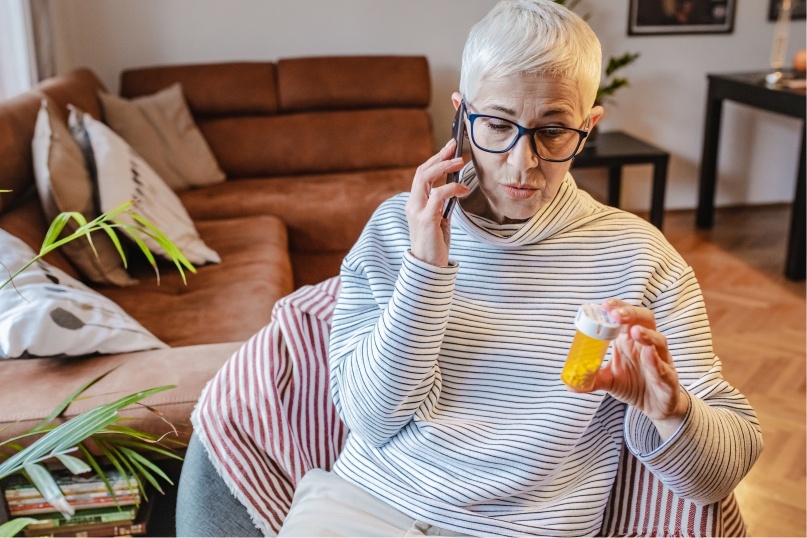
These days, no one wants to wait in line to refill a prescription at the pharmacy counter. At Lindo’s, we make it easier than ever to manage your prescriptions.
ACCESS YOUR PRESCRIPTIONS, CHECK THE STATUS, AND REQUEST REFILLS ONLINE:
Simply visit our online website portal to register (or sign in if you already have an account), or download our App from either the AppStore or Google Play to manage from your smartphone.
Download our Apps

CALL AHEAD:
Alternatively, you can always call ahead to make sure your prescriptions are up-to-date and available before you make a trip to the pharmacy. Our friendly pharmacists will be able to tell you quickly whether your prescription has expired, your refill status, etc.
Devonshire Pharmacy call: 441.236.7732 / Warwick Pharmacy call: 441.236.0010
Can CBD oil help calm your mind?
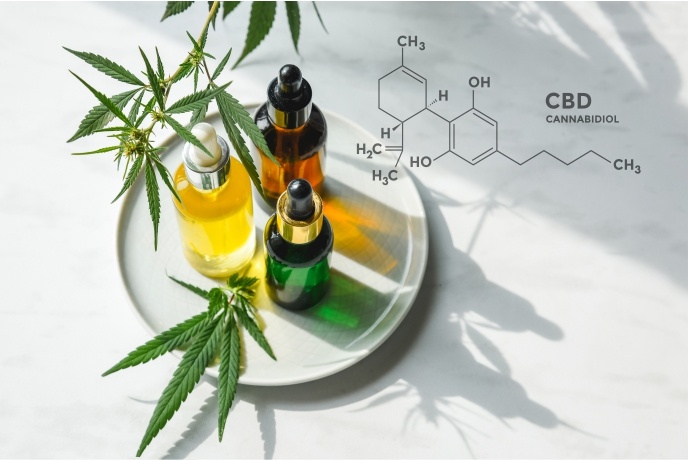

By Stephanie Simons,
Head Pharmacist,
Lindo’s Pharmacy in Devonshire
Of all the pharmaceutical developments over the past years, few have been more controversial – or misunderstood – than CBD. Though originating in the same marijuana plant as Tetrahydrocannabinol (THC) – the psychoactive drug more commonly known as ‘weed’ – CBD is a different chemical compound, without the intoxicating, potentially dangerous effects of THC.
Used in a wide range of products like drinks, gummies and even skincare, Cannabidiol (CBD) oil is found in both hemp plants and the cannabis plant Cannabis sativa. While it doesn’t give the ‘high’ associated with THC, it can provoke a relaxing response that soothes anxiety, stress and even pain.
The research is still in early stages, but many scientists believe that CBD oil can impact receptors in the brain. Receptors are proteins attached to your cells that receive chemical messages to help you respond to stimuli. CBD is thought to impact the brain’s receptors for serotonin, the neurotransmitter responsible for your mood, easing symptoms of stress, worry and social anxiety. Some people find it helps with related conditions like depression and Post Traumatic Stress Disorder (PTSD), while many find its relaxing effects improve their sleep.
CBD is also thought to improve the skin. When ingested, CBD impacts receptors in the body’s immune system, potentially reducing inflammation in the body which, in turn, can help prevent acne on both the body and face. CBD is found in a variety of topical skincare products too. Some studies say it can reduce sebum, the skin’s natural oil which, in high quantities, can cause acne. CBD is also packed with antioxidants which counteract free-radical damage and reduce both inflammation and signs of ageing – making it a fast-rising ingredient in the skin care industry.
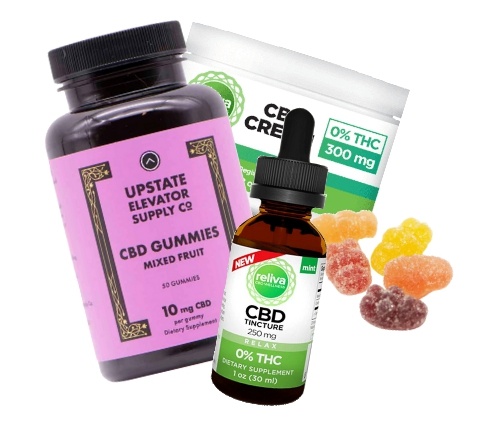
So – where to start? CBD is available in a wide range of products so you’re sure to find one that’s right for you. If you’re keen to ease your stress or get a better night’s sleep (aren’t we all?), try a drop or two of CBD oil like Reliva Tincture – Mint or Upstate Elevator Company’s CBD extracts in lemon or peppermint under your tongue for about 30 seconds to a minute. Start with a low dose of 250mg and build your way up as required.
If you prefer something sweet, Upstate Elevator Company’s 10mg Mixed Fruit CBD Gummies are a delicious way to incorporate CBD into your day. Or many enjoy one of their fizzy drinks, available in a wide range of flavours from Raspberry Hibiscus Lime Seltzer to African Ginger and Mexican Lime Soda, as a healthier alternative to that evening glass of wine.
For those with sore muscles, try applying Reliva Cream, a CBD-infused body cream that soothes and cools muscle ache. Those keen to boost their antioxidant defence can try USA Hemp’s Antioxidant Crème; jam-packed with CBD, organic avocado, jojoba, rosehip, carrot, and organic neem oil to keep those free radicals at bay and preserve your skin’s radiance.
You may see reports that CBD can be used to treat more complex physical issues including epilepsy, arthritis, and neurodegenerative disorders like Alzheimer’s disease. However, it’s important to note that if you’re managing a serious condition or symptoms, always consult your GP or pharmacist before trying CBD.
If you do take CBD and experience unpleasant side effects like diarrhoea, fatigue or a change in appetite, consult your doctor as soon as possible.
Stephanie Simons is the head pharmacist at Lindo’s Pharmacy in Devonshire. She earned her Bachelor of Science in Pharmacy at Massachusetts College of Pharmacy and has been practicing for over 20 years. She is a registered pharmacist with the Bermuda Pharmacy Council and is a member of the Bermuda Pharmaceutical Association.
Eat your greens!
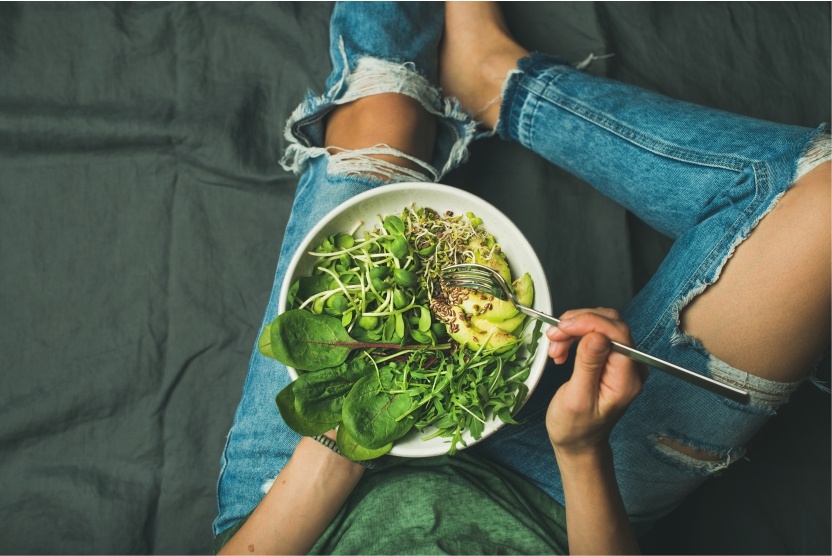

By Stephanie Simons,
Head Pharmacist,
Lindo’s Pharmacy in Devonshire
As children, we were all told to finish up our greens if we wanted dessert. Though annoying at the time – our mothers were right! Decades of scientific research has shown that eating leafy green vegetables is one of the simplest ways to maintain a healthy body and mind. Not only can it help you feel better in the short term, but these powerhouse foods can reduce your risk of numerous health problems down the road too.
Green veg get their vibrant colour from a pigment called chlorophyll. A potent antioxidant, ingesting chlorophyll helps your cells fight the damage caused by harmful free radicals found in your environment (e.g. sunlight or polluted air). It has also been shown to reduce inflammation and slow bacteria production, thus helping wounds to heal more quickly – and improving problematic skin.
You can increase your chlorophyll intake through supplements like Now Chlorophyll capsules or liquid or powders like wheatgrass (Pine’s Wheatgrass) or spirulina (Now Spirulina Powder). While these provide a great boost, it’s still worth adding more green veg to your diet, to get both your chlorophyll and a wide range of other benefits.
Many green veg like kale, spinach, and broccoli contain high levels of Vitamin K, which plays a key role in blood clotting, enabling the body to heal itself. New research also suggests that by helping the body to absorb calcium, Vitamin K is also important for bone health and can reduce the risk of fractures and osteoporosis. Supplements like Now Vitamin K are available if you’re concerned about your intake. Check with your GP or pharmacist first if you are taking any blood-thinning medication.
Green veg also contain folate (folic acid). Present in a variety of dark green veg, folate is a type of B vitamin which supports the production of red blood cells, helping you to stay energised, alert, and emotionally balanced. Folate is particularly critical for pregnant women as it reduces risk of neural tube defects like anencephaly and spina bifida. Pregnant women are often recommended adding a supplement like B-Complex + Folic Acid and Materna to their daily diet – do check with you’re GP if you’re not sure.
While oranges are known for their Vitamin C, green veg like peppers and broccoli can be even better! Another powerful antioxidant, Vitamin C supports your immune system, helps to keep your teeth, gums and skin healthy – and reduces your risk of cardiovascular disease and eye conditions like cataracts and glaucoma. Most people can benefit from both food and supplementary sources – Redoxon and Haliborange are great if your kids are picky eaters – to get the most out of this mighty nutrient.
However, it’s not all about vitamins. Many green vegetables like bok choi, peas and Brussel sprouts are also a great source of protein. Fundamental for the structure of our cells and tissues, protein plays a critical role in fuelling your body and carrying oxygen around your body in your blood. Many contemporary diets are deficient in protein, especially those that avoid meat or dairy – but green veg is an easy way to increase the protein on your plate.
But what if you don’t like it? It’s no secret that we’d all prefer a pizza over a bowl of greens, but there are ways to include vegetables in tasty ways. Spinach and kale are easy to pop into your morning smoothie – when blended with sweet fruits like bananas or berries, you won’t taste them at all! Add broccoli and zucchini to your curry or stir-fry or bake some kale chips for a quick snack. You don’t have to overhaul your eating habits – a small tweak here and there can make all the difference. Our busy lives can make it difficult to stay healthy but eating a bit more green veg is a simple way to boost your health every single day. If you’re concerned about your health or would like further advice, please contact your GP or local pharmacist.
Stephanie Simons is the head pharmacist at Lindo’s Pharmacy in Devonshire. She earned her Bachelor of Science in Pharmacy at Massachusetts College of Pharmacy and has been practicing for over 20 years. She is a registered pharmacist with the Bermuda Pharmacy Council and is a member of the Bermuda Pharmaceutical Association.

